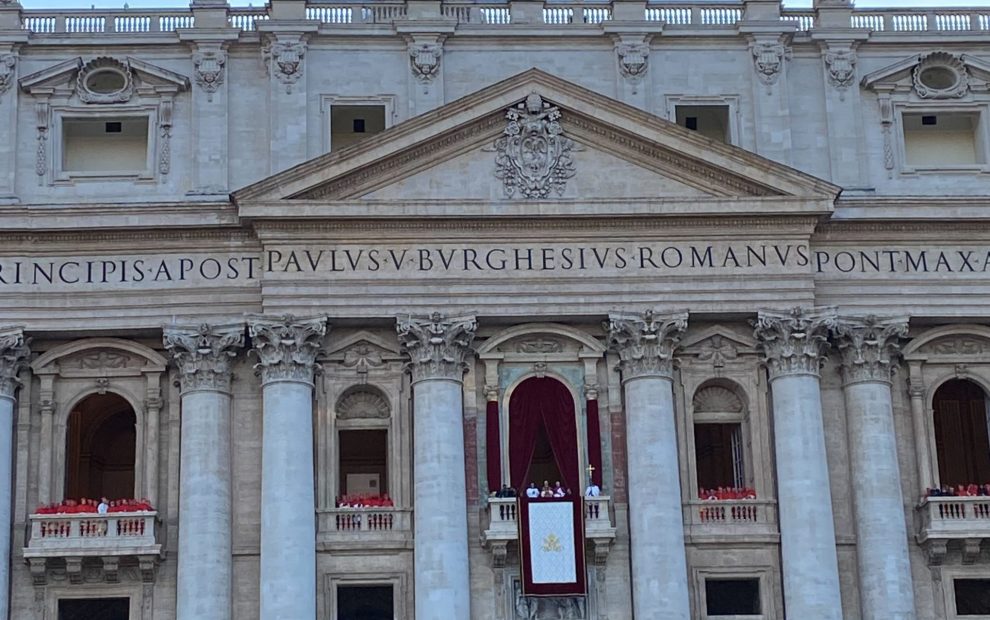VATICAN CITY––Just a few minutes after Leo XIV, the 267th Bishop of Rome, finished his Urbi et Orbi blessing from the balcony of St. Peter’s Basilica, the Survivors Network of those Abused by Priests (SNAP) addressed an open letter to the hour-old pope. They knew that their topic would strike a discordant note with the jubilant peals of bells from the Basilica
“When is it ever the right time to discuss the alarming reality of rape and sexual violence against children, which occurs every minute of every hour of every day in this troubled world?” SNAP wrote in a letter on Thursday. “Who, when engaged in prayer and praise for your ascension, wants to know about this disavowed and obscene underside of your church?”
A clergy abuse survivor from Toledo, Ohio, Barbara Blaine founded SNAP in 1988, organizing a few dozen clergy abuse survivors to support one another. In 2003, following the Boston Globe exposing the systemic cover-up of sexual abuse in Boston, SNAP founded a national office in Chicago.
Around 10 days before Pope Francis was hospitalized, the Vatican held a World Leaders Summit on Children’s Rights. In his closing remarks at the summit, Francis declared his intention to write an apostolic exhortation to children. SNAP invited the new pope to take on Francis’ uncompleted task.
“The first words you speak as pope should be to survivors and the children of the church,” they said.
On Wednesday, as the conclave opened with the Mass for the Election of the Roman Pontiff, SNAP held a press conference at the Orange Hotel, close outside the Vatican City walls. Sarah Pearson, a representative of SNAP’s media and communications team, said that their audience was the press, priests, bishops and cardinals, to remind them of that the issue of sexual abuse and ensuing cover-ups remained consistent from papacy to papacy.
“Current church laws do not protect and uphold the rights of children. They protect and uphold the immunity of bishops and clerics who abuse children, obstruct civil justice, and cover up sex crimes,” SNAP declared in a press release.
SNAP made five demands for Leo XIV’s first months in office, including outside investigation of abuse claims and cover-ups and a universal zero tolerance law adopted into canon law.
“It’s not this impossible demand,” Pearson said in an interview. “It’s not that it’s an unsolvable problem.”
Although the United States and other countries in the global north have strict child abuse laws, other countries do not.
“Because the church is not a monolith, you have different countries with different laws and you don’t have the same sort of zero tolerance policy,” said Jesuit Father Gerard McGlone, a research fellow at Georgetown University’s Berkley Center for Religion, Peace and World Affairs, in a Zoom interview.
“Unfortunately, the reforms of Francis were good, but not enough,” McGlone said, noting that a key weakness was that Francis did not mandate their implementation. Although Francis made omitting to report abuse a canon law crime, there was no timeline for implementation or consequences for failure to implement the new canon laws.
“What was done was necessary, and clearly insufficient,” he said.
While he called Francis’ 2019 reforms “groundbreaking,” McGlone noted that the real challenge was moving canon law from a perpetrator-based perspective to a victim-based perspective.
The current system, he said, fails to support the victim, provide transparency, and centers the perpetrator’s perspective. Systemic change is needed, he said, to orient the response to abuse around the victim’s experience and to create systems for restorative justice.
“This piecemeal approach has clearly failed and clearly supports perpetration in alarming rates in the Global South,” he said. “Because they’re not mandated to implement new changes in canon law, you see the widespread abuse that’s just under the surface.”
“I don’t want to compare the church to a pharmaceutical company,” Pearson said, “But if you’re working for a big corporation, how is a whistleblower treated?” She noted that they have seen a rise in priests reporting the cover-up of abuse cases to them, as a trusted outside source, rather than report to canonical or civil legal authorities.
“It’s hard to rise through the ranks if you’re blowing the whistle on abusive priests,” she said. She said many of the priests contacting them often seemed more scared than victims.
McGlone noted that there is still a reward for secrecy and covering up crimes than there is for transparency. He noted that Pope Francis was buried at the Basilica of Saint Mary Major, where Cardinal Bernard Law became the archpriest after he resigned as archbishop of Boston in 2004, the wake of the abuse crisis in Boston. “There is still a culture of reward for secrecy,” McGlone said.
McGlone said that researchers have discussed NASA’s embrace of the High Reliability Theory after the 1986 Challenger accident revealed systemic flaws. This is an adaptation from being a “high-risk” organization, where, as Pearson noted, exposing a cover-up of sex abuse could be a billion-dollar liability, to being a “highly reliable organization.” High Reliability Theory reorients the organization’s system to defer to outside experts and to reward whistle-blowers in the system.
McGlone did not beat around the challenges facing Pope Leo XIV. “He’s faced with an inconsistent application of existing policies and procedures that hampers credibility and trust,” McGlone said.
In their press release, SNAP poses the challenge to the new pope even more clearly: “You can end the abuse crisis—the only question is, will you?”
Image: Courtesy of Renee Roden














Add comment